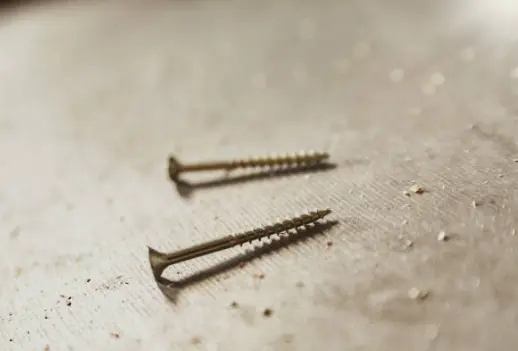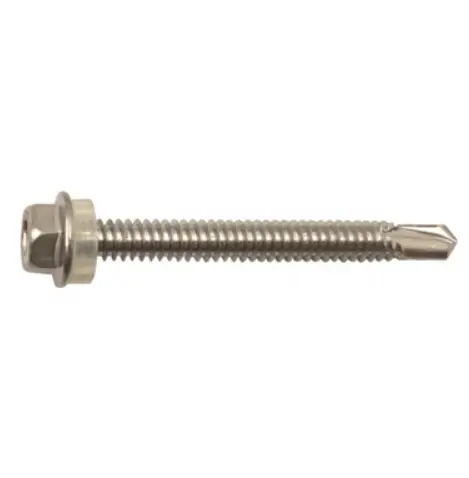caTEGORIES
Tags
Drill Screws vs. Traditional Screws: Key Benefits and Drawbacks

Posted: December 17, 2024
Categories: News
Self-tapping screws or drill screws are fastening tools that aim to simplify the process of fastening materials efficiently and effectively compared to conventional screws that necessitate a drilled hole before installation as drill screws come equipped with a built in drill bit, at the tip enabling them to pierce through materials without the need, for supplementary tools or procedures.
The Functionality of Drill Screws
Drill screws are mainly used for drilling and fastening at the time by cutting through materials, with their integrated drill bit to create a pilot hole efficiently. This not saves time. Also minimizes the requirement for various tools at the worksite. Their distinct design makes them especially handy for connecting metal to metal and metal, to wood applications.
Advantages of Using Drill Screws
Screw drills provide benefits compared to screws.
- Efficiency: By eliminating the need for a separate drilling step, you can significantly reduce installation time.
- Versatility: They are suitable for various materials including metal and wood, making them ideal for diverse projects.
- Reduced Tool Requirement: With drill screws, fewer tools are needed, which simplifies the work process.
- Consistent Performance: They provide consistent results due to their precise design.
For more information on where to source quality drill screws, consider visiting qewit.
Potential Drawbacks of Drill Screws
Even though using drill screws has its advantages there are also a drawbacks to consider;
- Material Limitations: They may not be suitable for extremely hard materials as this could wear down the drill tip quickly.
- Cost: Drill screws can be more expensive than traditional screws due to their specialized design.
- Skill Requirement: Proper alignment is crucial; incorrect angles can lead to ineffective fastening or damage to the material.
For any inquiries about specific applications or further assistance, feel free to contact us.
Why Consider Traditional Screws for Your Projects?
Screws that have been used for years are still widely used in construction and do it yourself tasks with the availability of modern fasteners such, as drill screws knowing the appropriate times and reasons to use them can improve the results of your project.
The Process Involved with Traditional Screws
When you’re using screws you typically start by drilling a hole into the material before putting in the screw and securing it tight. This technique is quite handy when accuracy is crucial or when dealing with materials that could easily break when pressured.
Benefits of Traditional Screws
Traditional screws offer distinct benefits:
- Precision Control: Allows for careful placement and depth control which is crucial in carpentry and fine woodworking.
- Material Compatibility: Suitable for a wide range of materials without risking damage from over-tightening.
- Availability: Widely available in various sizes and types like drywall screws or deck screws.
To explore different types of traditional fasteners, including drill screws, visit qewit’s product page.

Challenges Faced with Traditional Screws
Although traditional screws have advantages as drawbacks.
- Time Consumption: Requires more time due to the need for pre-drilling holes.
- Tool Dependency: Necessitates additional tools like drills and bits, increasing setup complexity.
- Potential Material Damage: Incorrect pilot hole size or misalignment can lead to splitting or weakening of materials.
In summary both drill screws and conventional screws serve their purpose, in construction and do it yourself tasks. Your decision should be based on project specifications such, as the type of material, time limitations and accuracy requirements.
How to Choose Between Drill Screws and Traditional Screws?
When you’re trying to choose between drill screws and regular screws for your projects needs and challenges in mind as both types have their advantages and limitations to consider.
Factors Influencing the Choice
Deciding between drill screws and traditional screws often depends a lot of things, like the materials you’re using and how fast you want to get the job done along with the tools you have for the task at hand. Drill screws work great when you need to put things and don’t want to use too many different tools in the process.They’re especially useful when joining metal parts or attaching metal to wood because of their built in drill bit design. On the side trusted traditional screws might be a better choice when accuracy is absolutely key – like, in woodworking projects or when dealing with delicate materials.
Evaluating Cost Implications
Cost factors also have an impact when choosing between these types of fasteners.Machine screws typically come with an price tag because of their specific design but they can help cut down labor expenses by speeding up the installation process.On the hand standard screws are usually cheaper, per piece. Might lead to extra expenses due, to the requirement of more tools and longer installation times.
Are There Situations Where Both Screw Types Can Be Used?
In situations and contexts using a combination of drill screws and conventional screws can yield outcomes by taking advantage of the unique benefits of each type.
Hybrid Applications and Their Benefits
Hybrid applications often start by using drill screws for fastening in areas where speed’s crucial and then switch to traditional screws in places that need precise alignment or extra support.This method proves useful in projects where different parts call for fastening methods.For example opt for drill screws for setting up components and rely on traditional screws to offer better control when adding final touches.
Industry Insights and Recommendations
Industry experts suggest that understanding the specific demands of your project is crucial when choosing between these fasteners. For construction projects involving mixed materials or varying thicknesses, a combination strategy can enhance efficiency and ensure structural integrity. For more insights into selecting the right fasteners for your needs, consider exploring options like drill screws from qewit’s extensive range.
To sum it up neatly. Drill screws and conventional screws each offer benefits tailored to project demands.Explore aspects, like material suitability cost considerations and application needs to arrive at a informed choice that maximizes both efficiency and cost efficiency in your building projects.
Exploring Innovative Screw Solutions in the Market
With advancements, in the construction and DIY sectors come developments in tools. Fasteners essential for their operation.The ability to grasp the trends, in screw technology can give you an edge and improve the results of your projects significantly.
Latest Trends in Screw Technology
In times there have been improvements where screwsre now more tailored, for specific uses and materials in a more specialized manner.Progressively popular are drill screws that excel at simplifying the installation process.These self drilling screws feature a built in drill bit at their tip enabling them to pierce through materials without the need, for pre drilling.This not saves time. Also minimizes the tools needed for the task.
A different trend we’re seeing is the creation of coatings that can resist corrosion and improve the longevity of screws used in settings or marine conditions This advancement aims to increase durability and dependability while reducing the necessary upkeep in the long run.
There is a growing trend, towards screw choices that prioritize sustainable materials and production methods to lessen environmental harm without compromising performance benchmarks.
Future Prospects for Screw Applications
The outlook, for the use of screws appears bright as advancements, in design and material science are anticipated to continue progressing in the future. As various industries strive for enhanced effectiveness and environmental friendliness screws are expected to adapt to fulfill these requirements.
An exciting prospect lies in fasteners integrated with sensors that offer updates on tension and weight bearing capabilities potentially transforming the construction industry through improved safety and accuracy.
Furthermore as 3 printing techniques progress unique screw configurations customized for projects may become more readily available providing specialized solutions unmatched, by conventional manufacturing processes.
For those interested in exploring cutting-edge fastening solutions, qewit offers a comprehensive range of products designed to meet diverse needs. Whether you’re looking for self-drilling screws or other innovative fasteners, their expertise can guide you in making informed choices.
In conclusion, staying informed about the latest trends and future prospects in screw technology can significantly impact your project’s success. By leveraging these innovations, you can achieve greater efficiency, cost-effectiveness, and sustainability in your construction endeavors. For personalized advice or inquiries about specific products, feel free to contact us.


